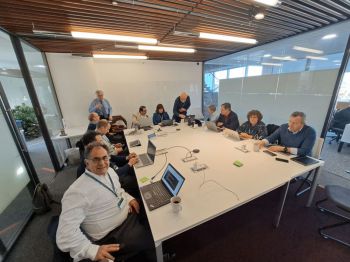Shaping the future of telecommunication networks: Insights from Prof. Maziar Nekovee
By: Bella Currie
Last updated: Wednesday, 25 September 2024

Kick-off meeting of the UKTIN Academic Strategy Group, Chaired by Prof. Maziar Nekovee (Photo Courtesy of Kostas Katsaros, UKTIN)
Published on behalf of Prof. Maziar Nekovee, Chair of UK Telecom Innovation.
The UKTIN Future Networks Academic Strategy Group was established to provide strategic direction and thought leadership in advancing the UK’s research and innovation in future telecommunication networks. The group brings together senior and early-career academic experts across the spectrum of technologies to capture the UK’s diverse academic perspectives on future networks.
Our role is to help create technology roadmaps with a time horizon of 2030 and beyond, which aligns academic research priorities with the future needs of the society and industry. This also includes identifying gaps in university education to cultivate the next generation of network innovators.
As Chair of the Group, I'm excited to share with you our first White Paper which has just been published by UKTIN and is delivered to the Department of Science, Innovation and Technology. The creation of the White Paper was a collaborative effort, bringing together academic experts, complimented by industry insights to capture diverse perspectives on the future of networks. Through workshops, discussions, and a rigorous review process, we distilled insights that not only have academic rigour but are also valuable for industry stakeholders. Telecommunications companies, network operators, and policymakers can all leverage our findings to guide their strategies and support innovation.
One key takeaway from the paper is that future networks will fundamentally reshape industries and society. Technologies like AI-driven wireless optimization and quantum communications are evolving rapidly, bringing what once seemed futuristic into the realm of the possible within the next decade.
6G, the next generation of mobile communication networks, could deliver peak speeds of 200 Gbps (so 20 times faster than 5G) at its maturity , enabling applications like holographic communication, digital twins, AI at the edge, and mobile robots being deployed everywhere, revolutionising sectors ranging from agriculture to healthcare. To manage the anticipated surge in mobile data, we can expect significant advancements in the fibre optics networks that form the backbone of the internet. The future may also see existing submarine fibre networks—critical to global communication—supplemented by space network of satellite systems with high-capacity laser links. This would enhance the resilience of global communication infrastructure against both intentional and unintentional disruptions.
This underlines the need for continuous and strategic investment and collaboration in research to keep the UK competitive on the global stage.
The paper also emphasizes the importance of sustainability and inclusivity in developing future networks. These technologies will be crucial in addressing global challenges like climate change and the digital divide. As we look ahead, we’re committed to ensuring that the benefits of these advancements are shared equitably across regions and populations.
As we continue our work, our focus remains on ensuring that the UK's academic research not only drives innovation but also contributes to global standards and solutions that address the challenges of tomorrow.




